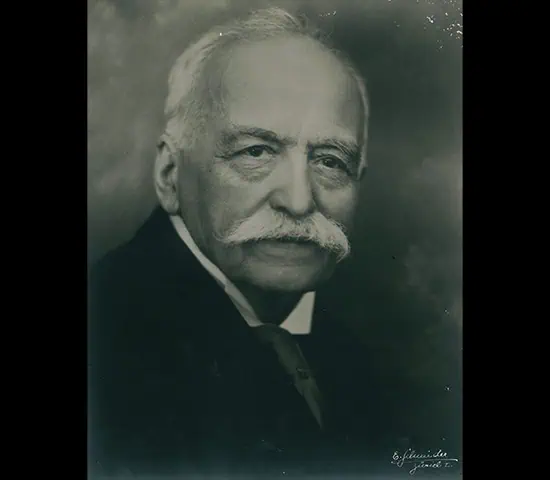Auguste Escoffier Humanist and Visionary
A visionary, Auguste Escoffier remains modern through his actions and writings. What he established during his career over 100 years ago is now known as Corporate Social Responsibility (CSR).
CSR is the practice of sustainable development within companies.
A company practicing CSR will therefore seek to have a positive impact on society, respecting the environment while remaining economically viable. A balance that it will seek to build with the help of its employees, customers, suppliers, shareholders and local stakeholders.
“Others will come tomorrow who will take up our work, who will rework it, who will transform it to adapt it to new needs”.

French Gastronomy around the world
Auguste Escoffier spent a large part of his career abroad (London, Switzerland, Monaco and the USA) and never ceased to promote French gastronomy and French chefs by placing them in the 4 corners of the world.
The Epicurean Dinners, which showcase French excellence, are his creation, and every October 28, the anniversary of his birth, the Disciples Escoffier association continues to organize these meals.
The last Epicurean Dinner organized by Auguste Escoffier was served in June 1914 to 10,000 customers in 147 cities around the world.
A century later, Thierry Marx declared that epicurean dinners represent a grand vision of what gastronomy should be. Not just dishes and recipes, but intentions and sharing. It’s the dream of universal peace, of men and women sitting around the same table, sharing the same meal.
In 1911, he founded the magazine Le Carnet d’Epicure. By publishing a French magazine abroad, his aim was to contribute to the development of tourism in France. He wrote about French cuisine, as well as wines, liqueurs and everything related to the arts of the table.
He became the ambassador of French gastronomy to the world. He became aware of the political dimension of the culinary arts.
Kitchen organization
He reorganized the kitchens to be more efficient and faster. He organized brigade work according to Frederick Taylor’s principles, such as task segmentation and the production line.
This brigade approach is still used today in all gourmet kitchens.
Working conditions
He adapts or creates equipment to improve ergonomics and working conditions.
It eliminates alcohol and cigarettes from its kitchens and demands exemplary behavior from its employees.
The relationship between kitchen and dining room
Through his association with César Ritz, Auguste Escoffier took charge of restaurant design for both the kitchen and the dining room, imposing faster service, equipment (escoffier plates) and fixed-price menus in gourmet restaurants.
He writes the Culinary Handbook to help service staff.
He is the first “star” chef to step out of his kitchen and greet his customers.
Like a marketing concept since adopted by many chefs, he made it fashionable to name dishes after his best customers (Pêche melba, rêve de Katinka, selle d’agneau à la Metternich) or fashionable events (Poire Belle Hélène).
When the Carlton was founded in 1899, he was put in charge of the kitchen, cellar and restaurants. He anticipated the position of Restaurant Director now held by many Michelin-starred chefs.
Product enhancement
He put the product back at the center of the plate. Escoffier was the first to emphasize the importance of the season, with a dual concern for taste and economy, inaugurating what we do today to respect our customers and the environment.
He creates recipes stipulating the origin of the products.
The first rules of hygiene and dietetics
Auguste Escoffier wanted to serve products of the highest possible quality. He implemented hygiene rules to ensure the freshness and quality of his products.
Aware that abundance was no longer an option, Auguste Escoffier became the first dietetic chef to follow the medical advances of his time, which advocated the relationship between diet and health.
Recovering waste and combating wasteful consumption
Waste nothing, recycle, repurpose and elevate scraps. This was Auguste Escoffier’s policy.
He also organized the delivery of surplus stoves in London with the Little Sisters of the Poor. The basis of the “People’s Aid” was born.
French food production and research
He encouraged French producers to expatriate and promoted them in England, Switzerland and the U.S. (Normandy Butter, Vaucluse aspargus, Rouen duck, foie gras from Alsace Périgord, wines ……). He became London’s leading exporter of French products.
He worked with the food industry, creating Kub broth with Julius Maggi, and pioneered the canning of crushed tomatoes. In 1903, with the creation of Escoffier Limited, which produces ready-made sauces. He became the first chef to associate his name with the food industry.
Knowledge transfer
The creation of the Culinary Guide. Over 5,000 recipes were compiled to form the basis of modern gastronomy. Today, this book remains the bible for all chefs. It helped modernize and codify cooking.
The Book of Menus was written to help young cooks with their education.
He has trained many chefs and has always taken care of their development.
The humanist work of Auguste Escoffier
In 1910, he published Mutual Assistance Project for the Eradication of Poverty. In it, Auguste Escoffier theorized a kind of social security system to finance pensions, copying the army pension system. His association with the powerful never made him forget the underprivileged and his own origins. He was always concerned about the lives of his compatriots and cooks. During the First World War, he set up a relief committee to provide financial aid to the wives and children of his cooks who had been mobilized or killed. In 1928, he wrote two books on rice and cod cooking for housewives. On the occasion of his jubilee, he donated the sums collected by his disciples, who wished to give him a work of art, to a retirement home for cooks in Dugny, Seine-et-Oise.